


Understanding the nuances of pellet therapy is essential for anyone considering this hormonal treatment. It’s important to recognize the potential side effects that can significantly impact your overall health. Many patients seek the benefits of hormone replacement, but the journey can come with unexpected challenges. You might experience mood swings, weight gain, skin reactions, or fatigue.
How can you navigate these complexities while keeping your cardiovascular health a priority? This article explores ten critical side effects of pellet therapy, providing you with the knowledge to manage your treatment effectively. Remember, you’re not alone in this journey; we’re here to support you in maintaining your well-being.
At Amavita Heart and Vascular Health, we truly understand how hormonal treatments, like pellet procedures, can have pellet therapy side effects that impact your cardiovascular well-being. Hormonal fluctuations can impact blood pressure, cholesterol levels, and overall heart function, which can be concerning.
That’s why we offer our Professional Testosterone Replacement Therapy Program for just $249 a month. This program provides clear pricing and expert support, including:
We believe in a thorough approach, ensuring that you receive personalized evaluations that consider your cardiovascular health before starting any treatment.
In addition to this, our innovative Virden Method™ minimizes discomfort while maximizing efficiency, which is essential for optimizing your outcomes and reducing risks associated with hormonal treatments, particularly pellet therapy side effects. Recent studies have shown that when testosterone replacement therapy is administered correctly, it can significantly enhance cardiovascular function and overall heart health. This makes it a vital part of the comprehensive care we provide at Amavita Heart and Vascular Wellness.
If you have any concerns about your heart health or hormonal treatments, we’re here to help. Your well-being is our priority, and we’re committed to supporting you every step of the way.
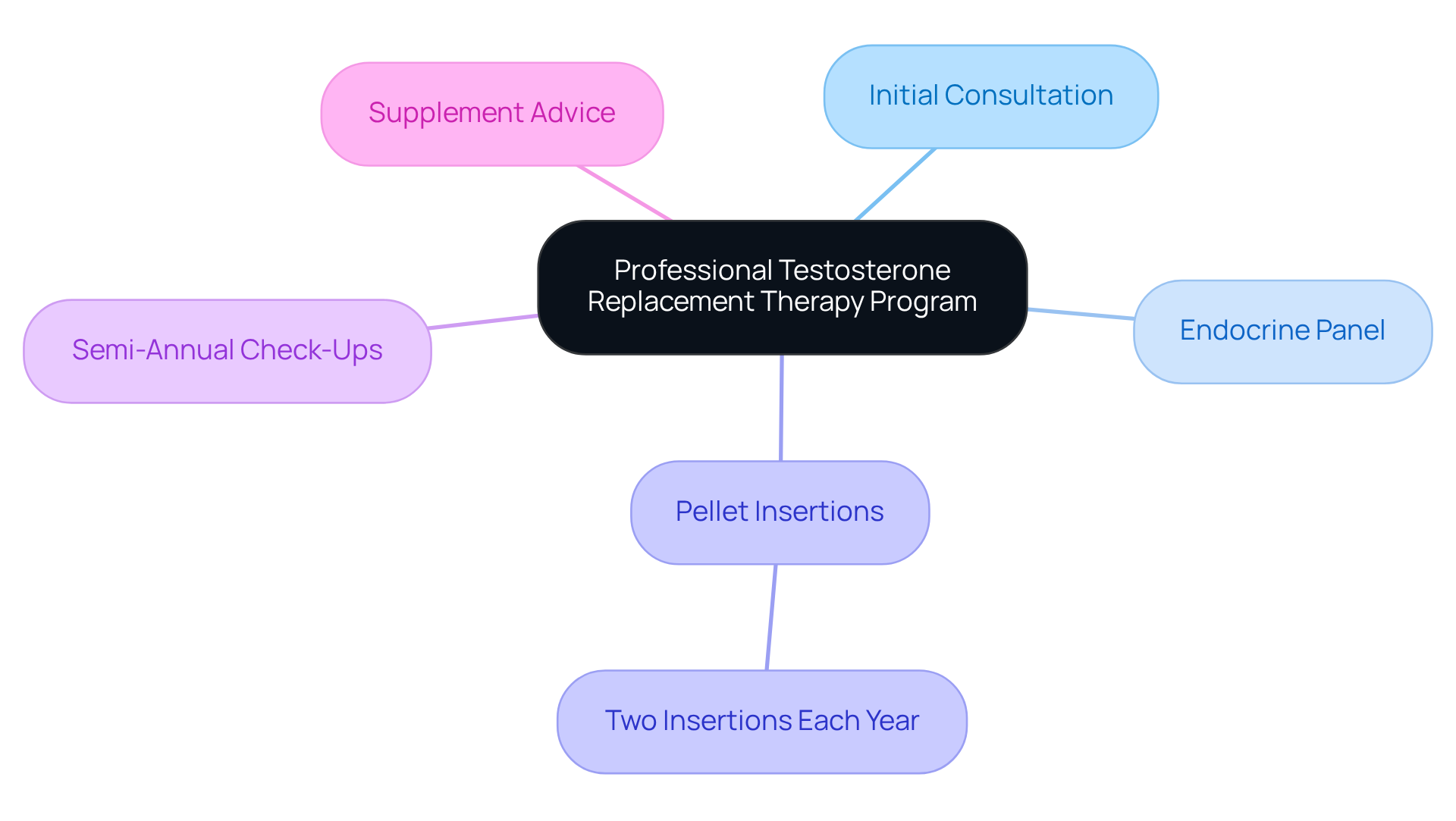
Weight gain can be a concerning side effect associated with pellet therapy side effects, often stemming from hormonal imbalances that disrupt metabolism and appetite regulation. Many patients notice changes in their body composition, such as an increase in fat mass while retaining muscle. This can be particularly worrisome for those with existing cardiovascular conditions, as weight gain may complicate heart health.
Have you ever wondered how hormonal fluctuations might affect your overall well-being? Research shows that these fluctuations can lead to higher cholesterol levels and increased blood pressure, both of which are risk factors for cardiovascular disease. However, there’s good news! Recent studies confirm that when testosterone replacement treatment is properly administered under expert medical supervision - like that provided at Amavita Heart and Vascular Health® - it can offer significant cardiovascular benefits.
In fact, previous research reviews suggest that hormonal treatment can reduce a woman's risk of heart disease by 50%. This highlights the importance of closely monitoring weight in relation to pellet therapy side effects during treatment. Dr. Samar El Khoudary reminds us, "We cannot treat all menopause hormone therapy types the same," which underscores the complexity of hormone therapy effects on cardiovascular conditions.
Therefore, it’s crucial for patients, especially those at high risk, to have open discussions with their healthcare providers about any concerns they may have. By doing so, you can effectively manage the pellet therapy side effects and lessen their impact on your overall health. Remember, you’re not alone in this journey; support is available to ensure a comprehensive approach to your cardiovascular care.

Pellet therapy side effects can sometimes include mood swings as your body adjusts to new hormone levels. During the first few weeks of treatment, you might notice heightened emotions, irritability, or even anxiety, which are considered pellet therapy side effects. While these fluctuations are often temporary, they can be quite distressing due to the pellet therapy side effects.
It's important to remember that you're not alone in this experience. Have you considered sharing these changes with your healthcare provider? They can offer strategies to help you manage these emotional disturbances, ensuring you feel supported throughout your treatment journey.
In addition to this, open communication can foster a nurturing environment where your concerns are heard and addressed. Your feelings matter, and your healthcare team is there to help you navigate this process with care and understanding.
Ultimately, seeking help is a sign of strength. Don't hesitate to reach out for support; together, we can work towards a more comfortable and balanced experience.
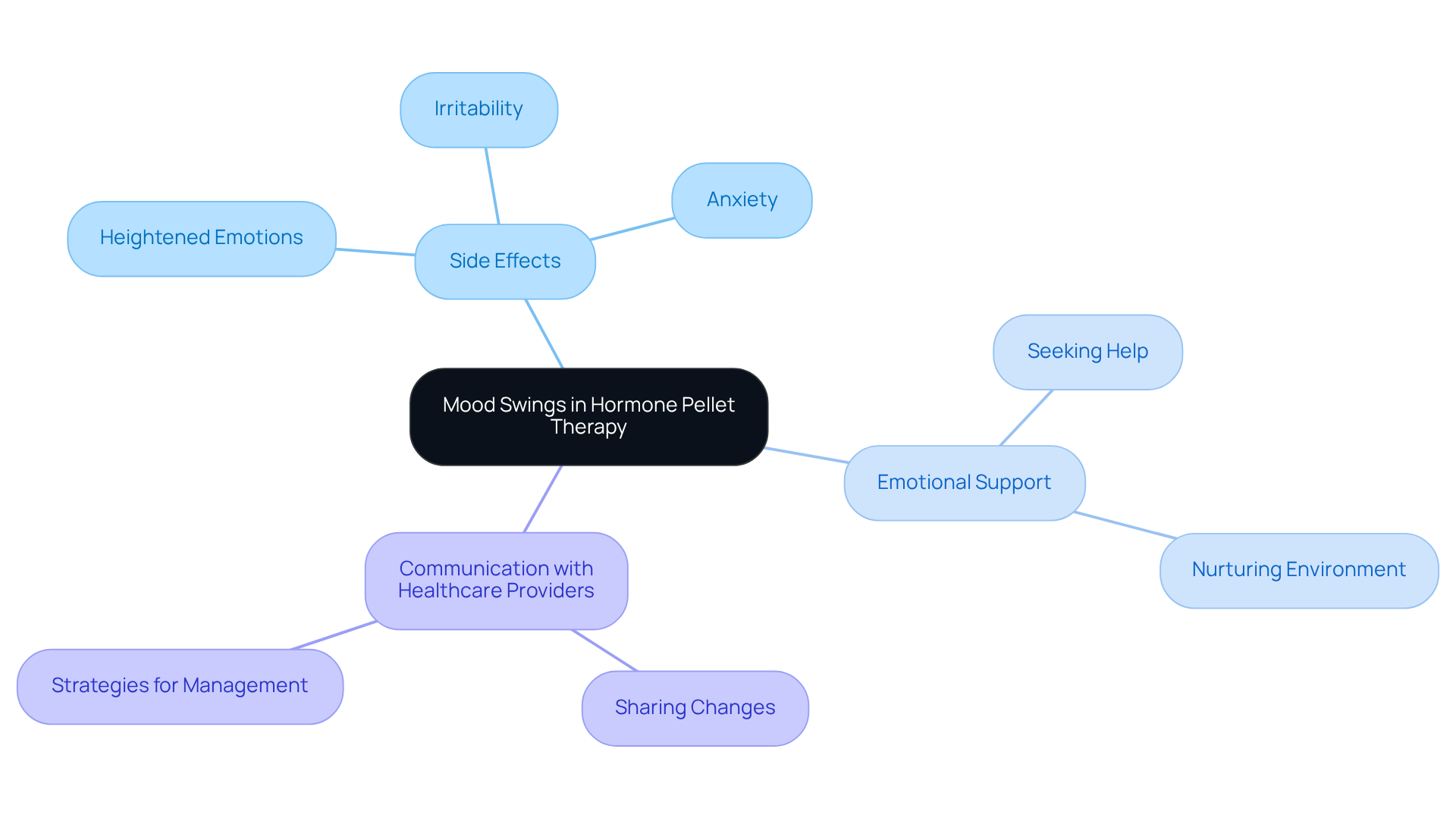
Serious health concerns, particularly regarding cardiovascular health, can arise from hormonal imbalances due to pellet therapy side effects. If levels aren’t properly managed, patients might experience pellet therapy side effects such as fatigue, weight gain, and mood swings. It’s important to recognize that pellet therapy side effects can increase the risk of heart-related issues, particularly for older adults. For example, research shows that women who undergo hormone replacement therapy may face pellet therapy side effects, including a higher chance of developing heart disease and stroke, particularly if they start treatment later in life.
At Amavita Heart and Vascular Wellness, we understand how overwhelming these concerns can be. That’s why regular monitoring and timely adjustments to therapy are essential for maintaining hormonal balance and reducing these risks. Our specialists emphasize the importance of personalized treatment strategies that consider each individual’s unique medical history, including common heart issues like:
In addition to this, we integrate advanced diagnostic imaging and minimally invasive procedures to enhance patient comfort and safety while effectively addressing both hormonal and cardiovascular health. It’s reassuring to know that when testosterone replacement therapy is administered correctly under expert supervision, it can offer significant cardiovascular benefits. This makes informed decision-making crucial in your care journey.
If you have concerns about your hormonal health or cardiovascular risks, we encourage you to reach out. Our compassionate team is here to support you every step of the way.
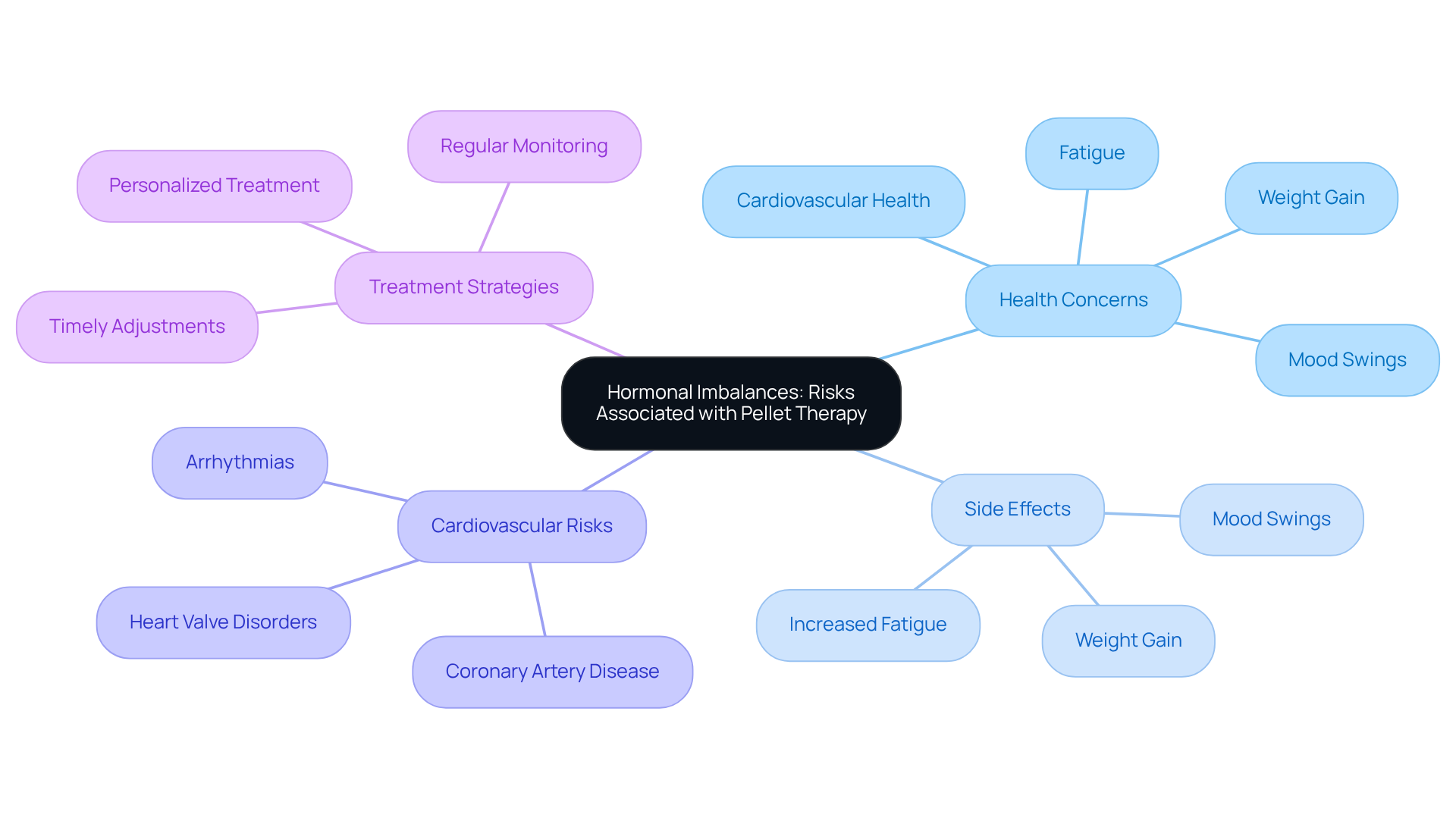
Patients undergoing hormone pellet therapy often have concerns about pellet therapy side effects, such as skin reactions including redness, itching, and acne. These reactions can occur at the insertion site or as a response to hormonal changes in the body. It's important to know that research shows over 25% of individuals experience some form of dermatological reaction as a pellet therapy side effect during treatment. While most skin issues are temporary, the pellet therapy side effects can be bothersome and negatively impact your quality of life.
Orsolya Kiss, a research scientist, explains, "Changes to ovarian function after menopause result in a notable decrease in levels of estrogen and progesterone, which can influence skin condition." This highlights how hormonal shifts can impact your skin. To help manage these effects, consider adopting a diligent skincare routine. It’s also crucial to report any persistent or severe reactions to your healthcare provider. This proactive approach ensures you receive the right support and helps maintain your skin health during treatment, particularly in managing pellet therapy side effects.
Furthermore, it's essential to recognize that replacement therapy may increase your skin's susceptibility to inflammation, but it can also enhance its ability to repair itself. Remember, you’re not alone in this journey. If you have any concerns or questions, don’t hesitate to reach out for support. Your well-being is important, and there are ways to navigate these challenges together.
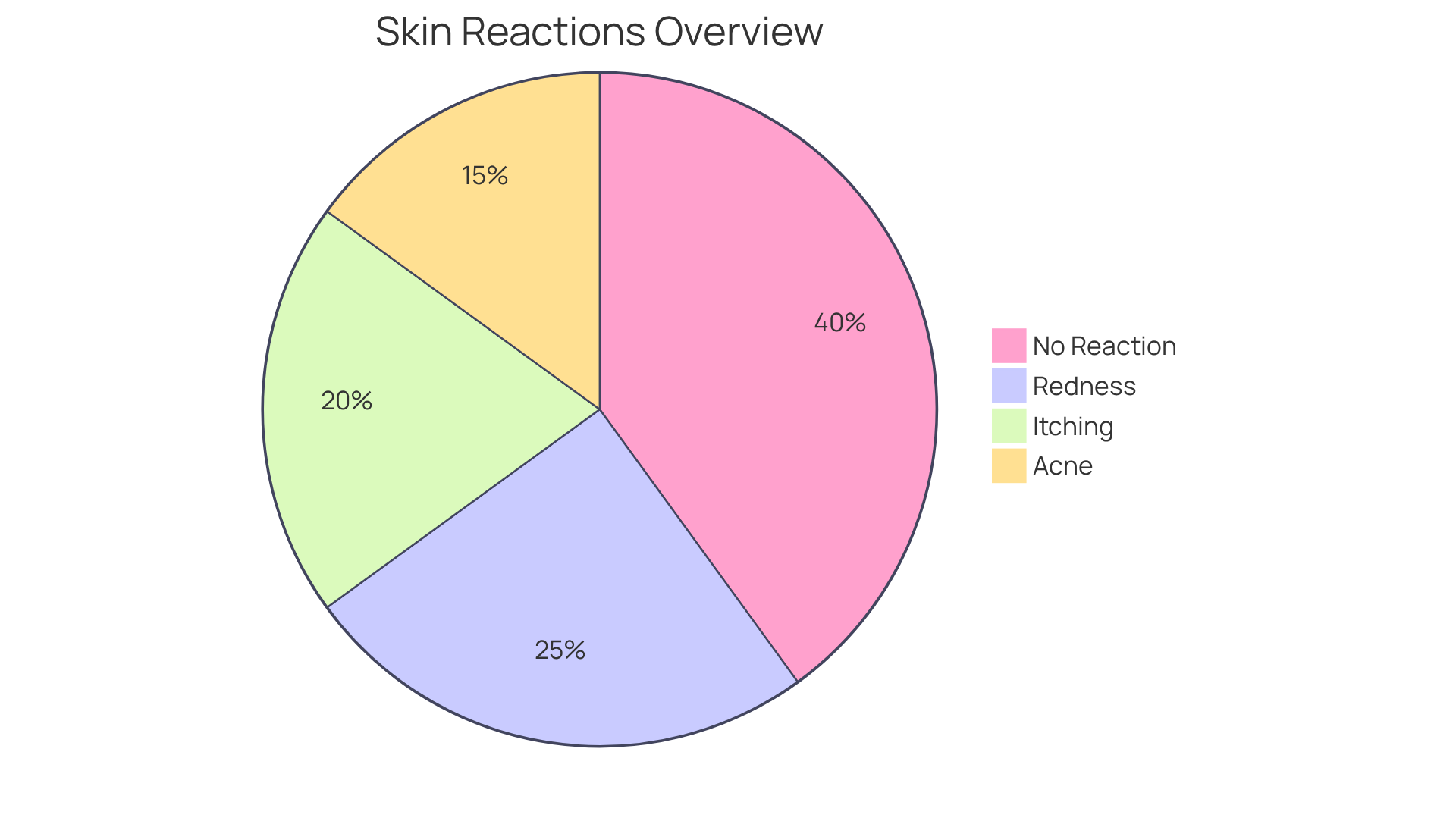
Headaches can be a common concern for those undergoing pellet treatment, often linked to changes in hormone levels. Did you know that around 45% of women on hormone replacement therapy (HRT) report experiencing headaches? Many describe these as tension headaches or migraines, particularly during the initial adjustment period. It's important to recognize that another 45% of women with migraines may find their symptoms worsening with HRT. This highlights how individual experiences can vary greatly, making personalized care essential.
To help manage these symptoms, keeping a headache diary can be incredibly beneficial. This simple tool allows you to track how often headaches occur, their intensity, and any potential triggers. By doing this, you can have more informed discussions with your healthcare provider about your experiences. As Dr. Colleen McCleery points out, it's vital to consult a healthcare professional regarding how HRT might affect your migraines. If headaches persist or worsen, it may be necessary to adjust your treatment to enhance your comfort and overall well-being.
Remember, you’re not alone in this journey. Seeking support and understanding from healthcare professionals can make a significant difference in managing your symptoms.

Fatigue is a common pellet therapy side effect that many people experience after pellet insertion, and it’s completely normal to feel unusually tired as your body adjusts to new hormone levels. Did you know that about 30% of individuals undergoing hormone therapy report pellet therapy side effects such as fatigue? This can be made worse by sleep disturbances or existing health issues. It’s essential to pay attention to how you feel; unusual tiredness during daily activities might also indicate heart conditions like coronary artery disease or heart failure.
At Amavita, we understand how concerning this can be. Our comprehensive cardiac evaluation is designed to pinpoint the specific cause of your fatigue, especially if you have risk factors such as:
To help manage this fatigue, it’s important to prioritize:
These simple lifestyle changes can significantly boost your energy levels and overall well-being.
Furthermore, regular follow-ups with your healthcare provider are crucial. They can help address ongoing fatigue and refine your treatment plan, ensuring you receive the support you need throughout your recovery journey. As we advance in endocrine treatment, understanding its impact on your energy levels is vital for improving your health outcomes.
If you’re feeling fatigued, consider scheduling a cardiac evaluation. It’s a proactive step towards assessing your heart health and creating a tailored management plan that works for you.
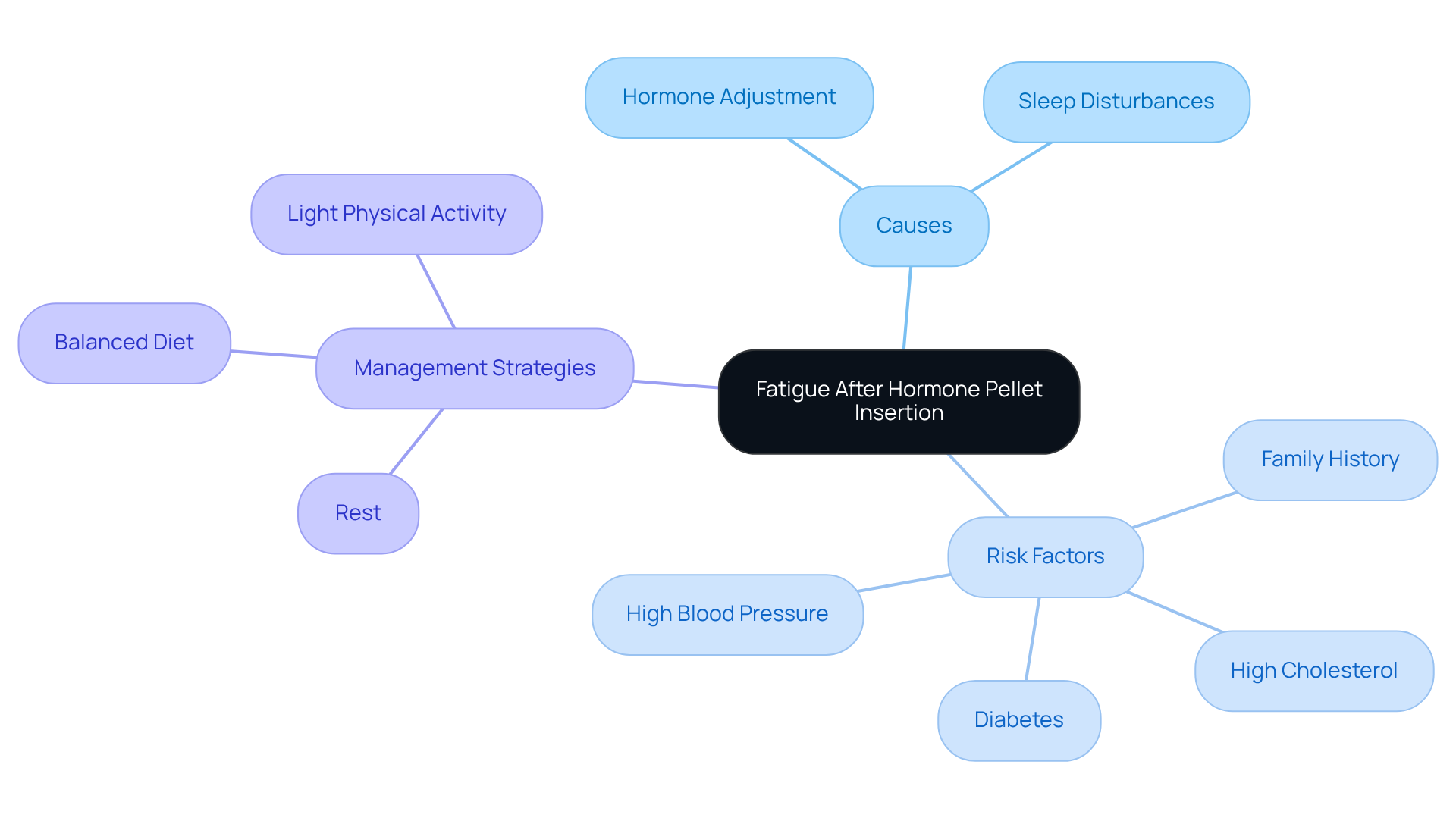
Hair loss can be a distressing side effect for some individuals undergoing treatment, which is one of the pellet therapy side effects often linked to hormonal fluctuations that disrupt the hair growth cycle. Did you know that about 13.5% of those on pellet therapy report pellet therapy side effects, including changes in their hair patterns? In contrast, only 2.6% of individuals on FDA-approved treatments experience this issue. This highlights a notable difference in how frequently this side effect occurs. These hormonal changes can lead to increased shedding or thinning, especially in women who are sensitive to dihydrotestosterone (DHT), a byproduct of testosterone known to contribute to hair loss.
While the thought of hair loss can be upsetting, it’s often a temporary concern that may improve as your body adjusts to the new hormonal levels, which can include pellet therapy side effects. Many patients find that their hair condition stabilizes after the initial adjustment period. If you’re facing significant hair loss, it’s important to reach out to a healthcare provider. They can offer personalized solutions, such as compounded replacement treatments that have shown effectiveness for women, or explore hair restoration options to help mitigate these effects.
Maintaining a balanced diet rich in leafy greens, protein, and healthy fats can also support your hair health during hormonal treatment. Furthermore, managing stress through activities like journaling and regular exercise may help stabilize hormonal levels and enhance your overall well-being. As awareness of pellet therapy side effects grows, it’s encouraged to have open conversations with your healthcare provider about personalized solutions that align with your health goals. Remember, you’re not alone in this journey, and there are caring professionals ready to support you.
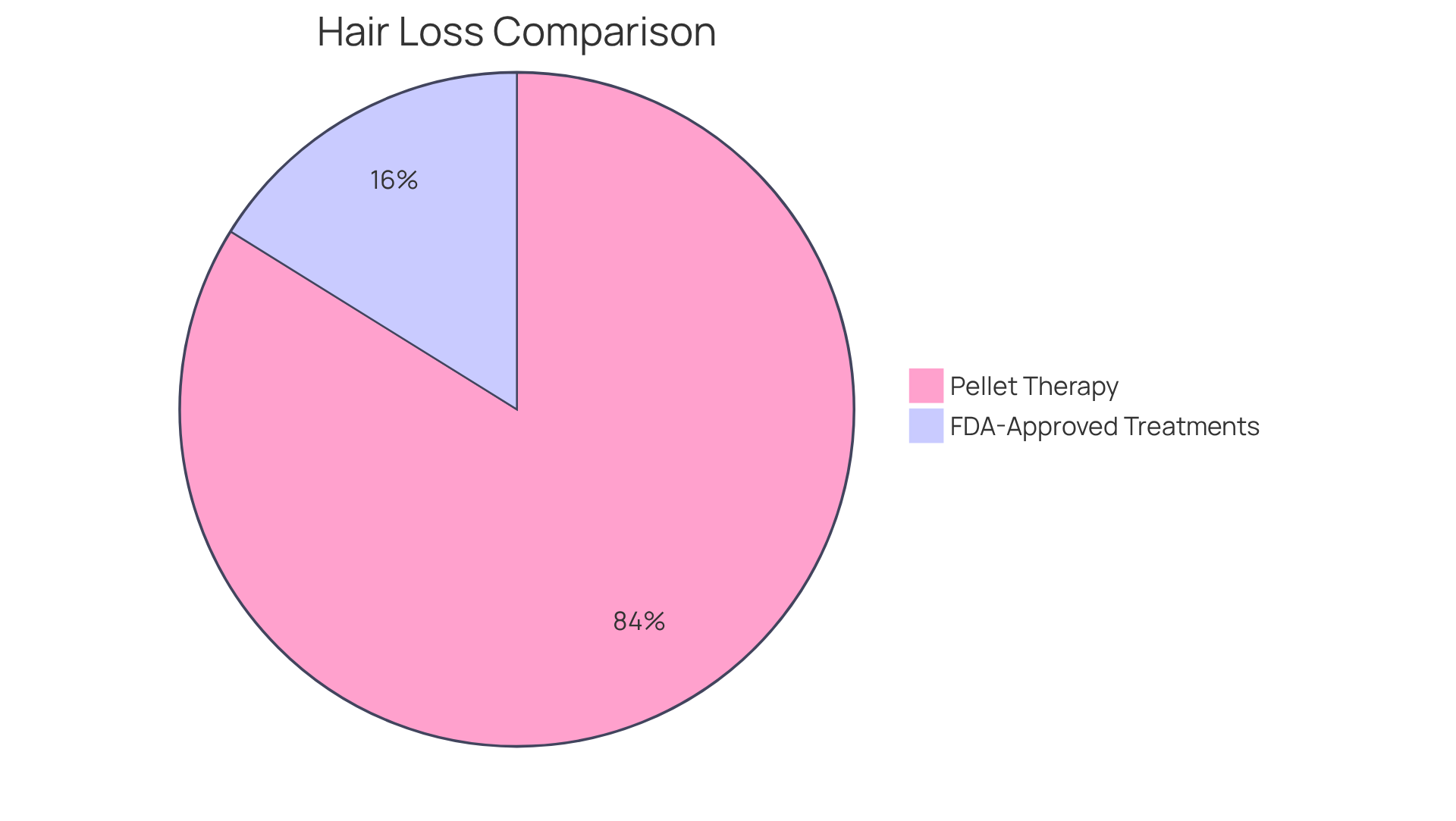
Heightened acne can be a significant concern for those undergoing hormone treatment, as one of the pellet therapy side effects, especially for individuals receiving testosterone. It's understandable to feel worried about how hormonal fluctuations might lead to increased oil production in the skin, resulting in breakouts. Research shows that around 30% of people on testosterone treatment may experience acne, which is considered one of the pellet therapy side effects.
To help manage this, it's important to adopt a skincare routine that focuses on non-comedogenic products, which are less likely to clog pores. If acne becomes severe or persistent, reaching out to a dermatologist can provide personalized treatment options that cater to your needs.
Dr. Nanette Santoro emphasizes the importance of discussing the pellet therapy side effects, as well as the potential risks and benefits of this medical intervention, with your healthcare provider. This conversation can help tailor your treatment plan to ensure it aligns with your health goals. Remember, you’re not alone in this journey, and there are supportive resources available to help you navigate these changes.

Breast sensitivity can be a common concern for many women who are dealing with pellet therapy side effects. This discomfort often arises as hormone levels fluctuate and stabilize after insertion. Did you know that research shows 57.6% of patients on oral hormone replacement therapy experience breast tenderness at some point? In contrast, only 36.0% of those on transdermal therapy report similar discomfort. This difference highlights the importance of awareness and effective management strategies.
While breast tenderness is usually temporary, it can still be bothersome due to pellet therapy side effects. It’s essential for patients to feel comfortable discussing any concerns about this issue with their healthcare provider. Open communication can lead to personalized strategies that help alleviate discomfort and ensure monitoring for any unusual changes. This approach ultimately enhances your overall treatment experience.
As noted in a recent study:
Remember, you’re not alone in this journey, and support is always available.

Understanding the various side effects of pellet therapy is essential for anyone considering or currently undergoing this treatment. It’s important to be informed about potential impacts on your physical and emotional well-being, especially regarding cardiovascular health. Each side effect, from weight gain and mood swings to skin reactions and fatigue, highlights the need for open communication with your healthcare provider. This ensures a tailored and supportive approach to your treatment.
While pellet therapy can lead to various side effects, many of these are manageable with the right strategies and medical oversight. Regular monitoring, personalized treatment plans, and a proactive approach can significantly reduce risks and enhance your overall experience. Facilities like Amavita Heart and Vascular Health emphasize comprehensive care, showing a commitment to addressing both hormonal and cardiovascular health. This means you’ll receive the support you need throughout your journey.
Ultimately, being aware of pellet therapy side effects isn’t just about recognizing challenges; it’s about empowering you to engage actively in your healthcare. By fostering open dialogue with your healthcare professionals, you can navigate these changes more effectively and make informed decisions that align with your health goals. Seeking support and understanding is vital, as it can lead to a more balanced and fulfilling experience during your treatment.
What is the focus of Amavita Heart and Vascular Health?
Amavita Heart and Vascular Health specializes in understanding the impact of hormonal treatments, such as pellet therapy, on cardiovascular health, including how hormonal fluctuations can affect blood pressure, cholesterol levels, and overall heart function.
What does the Professional Testosterone Replacement Therapy Program include?
The program includes an initial consultation, an endocrine panel, two pellet insertions each year, semi-annual check-ups, and basic supplement advice, all for $249 a month.
How does the Virden Method™ improve pellet therapy?
The Virden Method™ is designed to minimize discomfort while maximizing efficiency during pellet therapy, optimizing outcomes and reducing risks associated with hormonal treatments.
What cardiovascular benefits can testosterone replacement therapy provide?
When administered correctly, testosterone replacement therapy can significantly enhance cardiovascular function and overall heart health, potentially reducing a woman's risk of heart disease by 50%.
How can hormonal imbalances lead to weight gain?
Hormonal imbalances can disrupt metabolism and appetite regulation, leading to weight gain, which may include an increase in fat mass while retaining muscle.
What are the risks associated with weight gain during pellet therapy?
Weight gain can complicate heart health, particularly for patients with existing cardiovascular conditions, as it may lead to higher cholesterol levels and increased blood pressure.
What should patients do if they experience mood swings during hormone pellet therapy?
Patients experiencing mood swings should communicate with their healthcare provider, who can offer strategies to manage these emotional disturbances and provide support throughout the treatment process.
Why is open communication with healthcare providers important during hormonal treatment?
Open communication allows patients to express their concerns and receive the necessary support, fostering a nurturing environment that helps them navigate the emotional and physical changes during treatment.